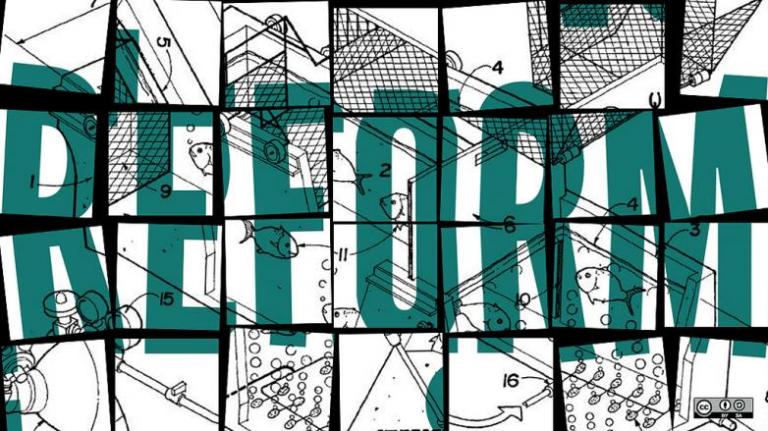A revolution approaches problems by overthrowing the old order and replacing it with something completely new. A reformation, on the other hand, approaches problems by reordering the existing state of affairs according to already-accepted ideals. The reformation of the church took place by returning to its foundations in Scripture and salvation by Christ. But other institutions can also be reformed. In light of our own political, cultural, and moral problems, we could say that America needs a reformation.
Furthermore, the editors, who have in mind particularly the need for moral reform in light of the #MeToo movement against sexual misconduct, look to Martin Luther for ideas about what such a reformation would involve.
They cite the first of Luther’s 95 Theses: “When our Lord and Master Jesus Christ said, ‘Repent’ ( Matthew 4:17 ), he willed the entire life of believers to be one of repentance.” The first step in any kind of reform is repentance. People need to be brought to the point of repenting for the status quo that needs to be reformed, including repentance for their part in it.
I would observe that a kind of secular repentance is taking place in Hollywood today–as symbolized by the black-garbed mourners of both sexes at the Golden Globes–as well as in newsrooms, corporate suites, faculty offices, and other places associated with “liberal” attitudes that have been revealed to be havens of sexual abuse.
But, as the editorial goes on to say, drawing on Luther, the repentance must be a constant and continual state. And it must bring on a changed heart. That is, as the editors cite a different quotation from Luther, there must be a justification by faith:
A human being was a sinner and would remain so regardless of whether they donated to church authorities, gave alms to the poor, or produced first-rate independent films. “Though you were nothing but good works from the soles of your feet to the crown of your head,” he wrote, “you would still not be righteous.” The love of God, which was the first commandment and the one authentic righteousness, was achievable “only by the faith of the heart.”
The editors go on to make comparisons between the church that Luther was trying to reform and today’s culture. They cite today’s “’indulgences’—pornography, plastic surgery, derivatives trading” and churches as in Luther’s time that instead of bringing people to life-changing faith offer little more a “blend of sanctimonious moralizing and political opportunism.”
The Point editors are making secular applications, so the parallels are not exact, and they pretty much overlook the main point and the major energizing factor in Luther’s reformation: namely, the Gospel of Jesus Christ.
But they do acknowledged the importance of both churches and religious schools for the moral reformation of a culture:
Luther’s re-formed church, with its weekly rituals and austere sermons, would not tell believers what to say or do so much as it would fortify them for the arduous work of navigating their own way to God. In this sense, it would offer a type of moral education that has grown harder to find in our secular institutions—schools and universities above all—but which ought to take on a renewed relevance in the broadening debate about sexual mores. Aimed at increasing the perspicuity of what Aristotle called the “eye of the soul,” this is an education in how best to pursue our visions of virtue. Its pedagogy is focused less on purifying “problematic” thoughts than on helping us develop the habits and willpower to contend with ineliminable impulses: inconvenient desires, uncomfortable sympathies, the fear of embarrassment, failure and death.
Notwithstanding what remains of psychoanalysis, churches and religious schools are today the institutions that most consistently combine, at least in theory, an ideal of moral maturity with a training in the habits of character necessary to practice it.
This is describing classical education, which Christians and churches are reviving!
Here is how the essay ends:
We are not all churchgoers, and will not be. Luther’s emphasis on the necessity of penitence, and on the role of the church as ministerial to the moral determination of the churchgoer, may nevertheless remind us that although fairer power structures and more enlightened institutions can help us develop the discipline to choose our higher values over our lower urges, they will never cure us of the need for that discipline. Nor should we be so naïve as to think that our institutions will ever be better—less racist or sexist or materialistic, more equitable or loving or fair—than we are.
As per Luther’s 95th thesis, this need not be reason for despair: “And let them thus be more confident of entering heaven through many tribulations rather than through a false assurance of peace.” Reformation may be continuous, but so is hope.
With this framework, what would a political reformation look like? (Going back to the Constitution like Luther went back to the Bible? Recovering the common American ideals of life, liberty, and the pursuit of happiness? Finding new ways to embody these ideals so that they are more than patriotic cliches?)
We already have educational reform movements, the most effective being classical education. We have just enacted “tax reform. “What other areas of American life and culture are ripe for reformation, and how might that be achieved?
Illustration from opensource.com via Flickr, Creative Commons License














